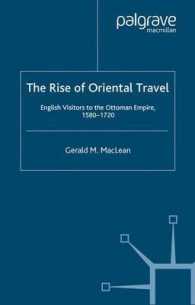- ホーム
- > 洋書
- > 英文書
- > Philosophy
Full Description
This book is a systematic study of the paradoxical character of Spinoza's political philosophy, theory of change, and conception of childhood by one of his most original interpreters. Spinoza's Paradoxical Conservatism highlights the radical novelty of the philosopher's work while drawing attention to previously underappreciated aspects of his philosophy and providing decisive historical context for his interventions in political theory and pedagogy. The problem of transformation in Spinoza's philosophy is explored across three studies: one on ethical conversion and becoming wise, one on childhood and growing up, and one on absolute monarchy and the 'free multitude'. This volume contains as an appendix a discussion with Pierre Macherey, whose critical response to the book provided an occasion for the author to clarify the themes and stakes of the investigation.







